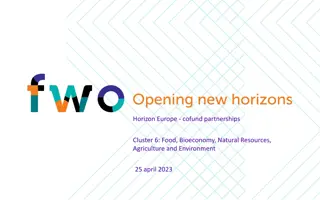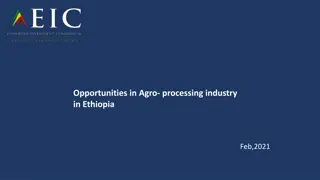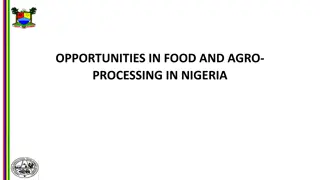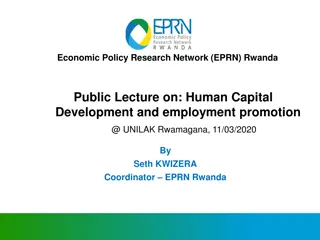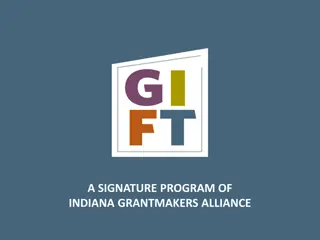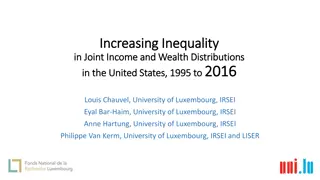ROLE OF PARTNERSHIPS AND LINKAGES IN AGRO INDUSTRALISATION FOR WEALTH CREATION
Agro-industrialization involves agro-processing, distribution, and farm input provision to manage changes in the sector. Partnerships play a crucial role in enhancing market linkages, technology sharing, and capacity building for inclusive growth in Uganda's agro-industry.
Download Presentation

Please find below an Image/Link to download the presentation.
The content on the website is provided AS IS for your information and personal use only. It may not be sold, licensed, or shared on other websites without obtaining consent from the author.If you encounter any issues during the download, it is possible that the publisher has removed the file from their server.
You are allowed to download the files provided on this website for personal or commercial use, subject to the condition that they are used lawfully. All files are the property of their respective owners.
The content on the website is provided AS IS for your information and personal use only. It may not be sold, licensed, or shared on other websites without obtaining consent from the author.
E N D
Presentation Transcript
ROLE OF PARTNERSHIPS AND LINKAGES IN AGRO INDUSTRALISATION FOR WEALTH CREATION NAADS SECRETARIAT
What is Agro industrialization? A combination of three major processes: Agro-processing, distribution, and farm input provision, off- farm activities within the value chain of a commodity/set of commodities Managing changes in the farm sector: product composition, technology, and sectorial and market structures within a commodity value chain Institutional & organizational coordination between agro- processing firms & farms
What is agro-industrialisation? Agro- Note: processing, distribution, and farm input provision, activities off- farm Agro-processing or agri-business is not equivalent to agro-industrialisation Agro- industrialisation Managing parallel changes in the farm sector, such as changes in product composition, technology, and sectoral and market structures Institutional & organizational coordination between agro- processing firms & farms 3 Source:(Reardon, & Barrett, 2000
Why Uganda should prioritise agro-industry? Quest for inclusive growth Promote rural Growth Closing regional income disparities Ready market for raw materials & agro-products Population growth rate & urbanisation (national, regional and continental) A significant number of SME s are sourcing raw materials locally & operating under capacity Forward & backward linkages with multiplier effects Agriculture supplies industry & industry supplies agriculture Upgrading export value chains from low to high value agro- products Address post harvest losses [avg 20%-40%] 4
Why Partnerships in agro industrialisation ?? Linkage to markets and infrastructure: Requires that farmers can readily access inputs including technologies as well as output markets and that the associated infrastructure is available. Establishment of quality standards: Successful exploitation of national, regional and international markets demands the establishment of quality standards for Uganda s products. Capacity building: Building capacity of all stakeholders to efficiently identify and address the constraints to production, processing and marketing of agricultural produce. Technology development and sharing: For improved production and efficiency. Enhance production in terms of both quantity and quality. Provision of inputs: Access to credit and/or leasing facilities in various forms for such inputs.
Key Linkages in agro industrialization Linkages between global, regional and national Institutions Linkages between national institutions(Policies, legal, political agenda) and support services (Infrastructure, R&D, Finance, standards, Human capital, Land etc) Linkage between support services and traders/exporters Linkage between production systems with agro processing, domestic and external markets
Analytical framework for Agro Analytical framework for Agro- -industrialization industrialization Source: EPRC s conceptualization of Agro-industry, 2017 7
Key players in Agro industrial Development in Key players in Agro industrial Development in Uganda Uganda MAAIF WITH PRIVATE SECTOR, DONORS, FARMER/FARMER ORGS PRODUCTION & PRODUCTIVITY MAAIF (primary processing) PRIVATE SECTOR, FARMERS, MTIC (industrial scale) WITH PRIVATE SECTOR, -TRANSFORMATIVE: PROCESSING / VALUE ADDITION MAAIF (on-farm & Local) WITH PRICATE SERVICE PROVIDERS, FARMER ORGS, MTIC (Domestic & External) WITH PRIVATE SECTOR, FOs and COPERATIVES, PRIVATE SERVICE PROVIDERS, NGOs MARKET ACCESS & PROMOTION 8
Highlights of NAADS Agro Industrialization initiatives Alvan Blanch/MAAIF/UDC- -Establishing of fruit processing facilities in Nwoya, Nakaseke, Kayunga, Busoga, Masaka - Establishment of grain cleaning, drying and silo storage facilities e.g Banyatereza Sisters NAADS/FONAS/Yumbe DLG, Farmer cooperatives: Establishment of Mango processing facility in Yumbe NAADS/WFP- Construction of 10 grain community stores NAADS/MAAIF/Private processors/Gulu Arch Diocese: piloting commercialization of cassava in Northern Uganda NAADS/Horyal Holdings LTD/Atiak Sugrcane Out growers Cooperative: Commercialization of sugar cane production in Northern Uganda
NAADS agro industrial initiatives cont Establishment of 10 community grain stores in 10 districts ( Napak, Adjumani, Kiryandongo, Masindi, Hoima, Kyenjojo, Kakumiro, Mubende, Nakaseke & Kiboga).This was through joint efforts by NAADS, WFP, DLGs Value addition particularly focusing provision of milling equipment for grain (maize, rice). Procured and distributed 37 units ofMaize mills and matching equipment. Established through partnerships between NAADS, Farmers Groups and DLGs Procured and distributed 52units of Milk coolers with matching generators. Established through NAADS working with Farmer, groups, cooperatives and associations together with DLGs.
Key roles of partners Provide farmers with links to markets and associated bulking facilities where applicable. LGs through Commercial Depts provide support Agro-processing: avail infrastructure for processing of some of the agricultural products from the out-growers: Private sector, Govts working through PPPs with Private Sector, Fos with or without Govt support Train farmers in order to impact skills in: Best production management practices for increased productivity of the identified enterprises. MAAIF works with LG department of production, NGOs, Private service providers to provide technical support to farmers. Post harvest handling and primary processing of the primary products of the enterprises: Government agencies working with Private sector, Fos and Cooperatives involved in PH activities.
Roles of partners cont. Identify and support model (Contact) farmers from the farmers groups within the catchments area. LGs work with private sector to mobilise contract farming arrangements to guarantee supply to processing facilities. Multiply and avail technology materials to farmers in the catchment area:Private sector players such as DELIGHT (Nwoya) and Horyal (Atiak) working with or without government, provide planting materials to farmers and farmer groups in out growers schemes Disseminate relevant market information to farmers, including quantities and quality requirements as well as prices offered in the market: LG department of Commercial Services, private sector players, provide routine market price advisories to Farmers and FGs Develop contractual arrangement for produce buying and distribution of associated inputs, including where needed operating a farmer credit scheme.
Key areas for partnerships Transformative shifts in Service Delivery 1. Extension Services management Policy & Regulatory Adjustments 2. Input Supply Systems 3. Financing 4. Business Development Services 1) Policy & Regulatory gap -filling Funding Adjustments 5. Smallholder Irrigation 2) Farmer Registration 6. Predictable Commodity Pricing 3) Profiling of strategic agro-manufacturing industries 7. Investment Promotion - VCD Approach 1) Non-Wage for Extension Workers 8. Feasibility Studies for VCD 4) Industry Responsive R&D programme 2) Business Development Services and Skills Development Facility 9. Management and use of institutional public land such as Government Ranches 5) Product and Enterprise Development 6) Common External Tariff Review - Sensitive List 3) Capitalisation of UDC & UDB 10. Survellience, Inspection & Enforcement 7) Structured Demand Deals 4) Industry specific R&D initiatives 8) Investment Incentives 5) Farmer Registration 9) Commercialisation of Public Infrastructure Services 6) Profile of agro-manufacturing industries 7) Branding for Market Capture 8) Water for Production Retail Subsidy 8) Centralised Knowledge Management System for AGI 9) Regionalisation of UIRI & UNBS 10) Enhanced Value Chain Financing by ACF
Rethink Governments Future Role Rethink Government s Future Role Government has to step up its role beyond creating an enabling environment : To being a strategic player to foster a sustainable agro- industry agenda. Actively/practically participating in development of selected agro- industrial value chains. Balance a developmental state and free- market ideology 14


